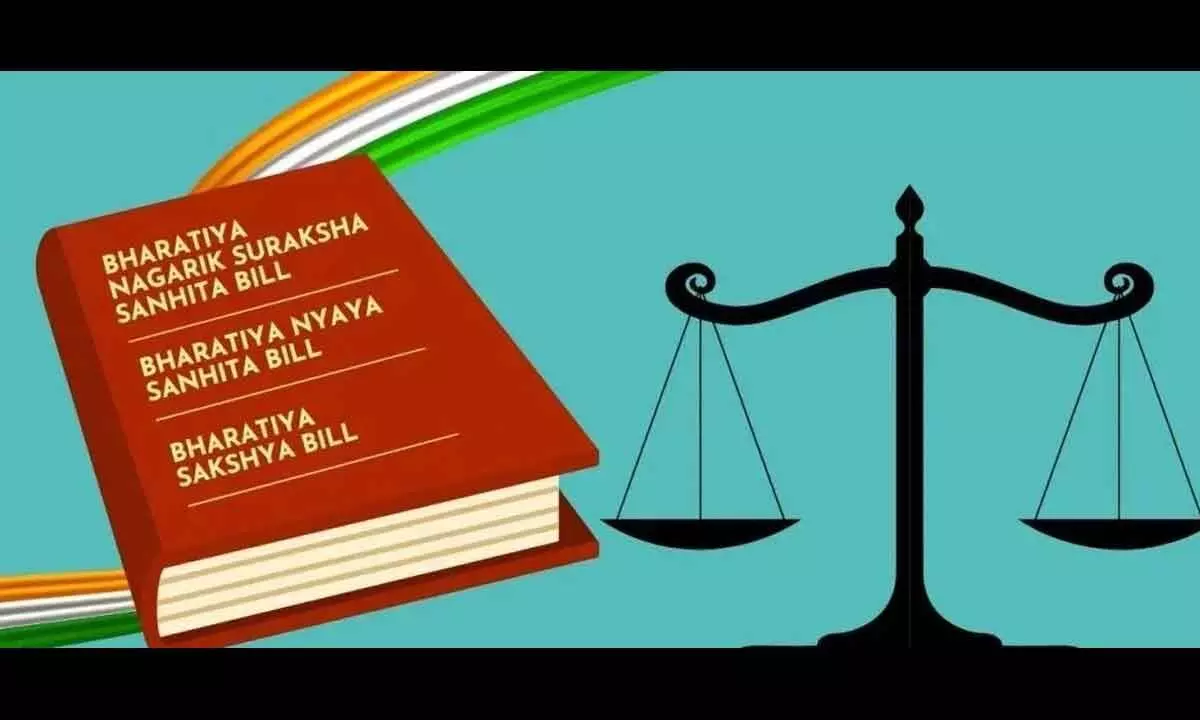Will this lead to faster enforcement and justice, or is it an old wine in a new bottle?
The first major striking observation is on the sections in the new laws. The IPC has been revised as BNS and the new law has 358 sections compared to the 511 sections
image for illustrative purpose

On July 1, 2024, the 100 plus years of criminal laws, IPC, Law of Evidence repealed along with the CrPC and now the three new criminal laws which have come into effect are in action. These laws are Bhartiya Nyaya Sanhita (BNS) Bhartiya Sakshya Adhiniyam (BSA) and Bhartiya Nagrik Suraksha Sanhita (BNSS) which will be followed for all criminal cases happening after July 1, 2024. All the pending cases before this will be dealt as per the old law procedures. Hence, lawyers, Police, Judiciary and citizens must be aware of these laws, remedies and punishments to keep the jurisprudence ticking in this area of law and justice.
The first major striking observation is on the sections in the new laws. The IPC has been revised as BNS and the new law has 358 sections compared to the 511 sections. The CrPC has been revised to 531 sections from the existing 484 and the Law of evidence has been enacted with 170 sections instead of 167 sections.
These new laws will bring in the much-needed procedural and structural changes in the criminal justice system in India which was long due.
To begin with, now citizens can file a complaint online instead of going to the Police station immediately and lodge a zero FIR irrespective of the Jurisdiction. This is a welcome change as many take time to go to the Police station. The BNSS introduces a new statutory requirement for the police to conduct a preliminary enquiry to determine if a prima facie case exists before registering an FIR. This again will help to rule out frivolous FIRs by complainant. They will be under scrutiny to prove the crime post which the Police shall register the FIR.
Also, as per the new Evidence Act, now digital and electronic recordings will be streamlined like any other documents to be taken as ‘primary evidence’ or ‘secondary evidence’. Thus broadening the scope of evidence in the court. Another major overhaul is the permit of the forensic lab officials to the site of crime to collect samples directly instead of sending them to labs for testing and taking more time and ironing out deviations.
For the first time community service has been added as a form of punishment for specific crimes. This is a welcome step to rehabilitate criminals who must do some community service while serving the sentence like in the western countries.
Also, for the first time in the new law, Terrorist Act has been well defined additionally with Mob Lynching, petty crimes and organized crimes have been added in the code along with the introduction of the term economic offence and other provisions for medical negligence. Theft is now defined as data theft and identity theft which is again a big welcome change. Other salient features are police custody increased from 15 to 90 days, allowing trials in absentia, introduces Zero FIR (allowing FIRs at any police station), and includes electronic summons and a Witness Protection Scheme. The silver lining in the new law is the pronouncement of judgment in criminal cases has to come within 45 days of completion of trial and charges must be framed within 60 days of first hearing.
Another major striking change brought in the BNSS is the powers to attach property linked to criminal activity during the investigation stage. This power is like the Enforcement Directorate’s power under the Prevention of Money Laundering Act, 2002, but it is more extensive, and the standard required to be met is less stringent. We need to see how Magistrates and Police will use this power in cases going forward.
In conclusion, the New Criminal Laws will help for a fast and efficient criminal justice system, promising both challenges and opportunities. The transition of the laws with the current technological changes of the present time will only be effective and efficient if the law enforcement agencies adapt to the new procedures fast and untether themselves from the erstwhile regime. Time will say whether the new laws will bring in faster Justice and better Enforcement as some believe its old wine in a new bottle while others have the confidence that this will bring in much hope for victims of crimes who have lost faith in today’s judicial system.
(The author is Head Legal & IPR, Resolute Group.)

